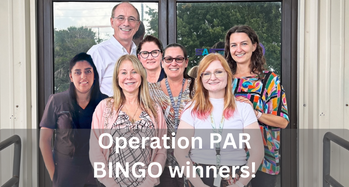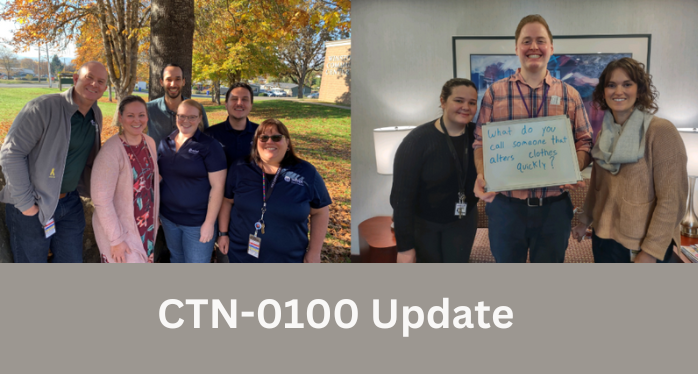-
News from the Ohio Valley Node: CTN-0152 Opens for Recruitment!
The CTN-OVN has successfully led pre-initiation activities for the CTN-0152 (TAB; LI – Winhusen) study, and the first two sites are now open for participant recruitment. TAB is a double-blind, randomized, placebo-controlled, intent-to-treat trial designed to evaluate the effect of weekly subcutaneous (SQ) tirzepatide versus placebo as an adjunct to buprenorphine maintenance treatment (BUP) for opioid use disorder. Approximately 310 participants who have recently initiated BUP will be randomized across 10 study sites. Congratulations to the study teams at Vanderbilt University Medical Center (Nashville, TN) and West Virginia University Medicine Healthy Minds – Chestnut Ridge (Morgantown, WV) for being the first two sites to open for recruitment! Posted on December 18, 2025
-
News from the Greater Intermountain Node: Upcoming Cannabis Seminar and CTN-0151 Updates
Greater Intermountain Node Seminar Series “On the Rocks” On the Rocks (OTR) is the Greater Intermountain Node’s (GIN) monthly Research Discussion Series, spotlighting standout addiction-related research from across the Greater Intermountain community. Designed for dynamic exchange, OTR fosters collaboration and fresh thinking through interactive conversations between presenters and attendees. The series name nods to the stunning Rocky Mountain backdrop and the iconic Utah trails just steps from our offices. Join us for the next OTR on Wednesday, October 1, 2025, from 12–1 PM MST, featuring “Cannabis: Balancing Risk and Therapeutic Potential” with Marcel O. Bonn-Miller, PhD. Dr. Bonn-Miller will share insights from three key research areas: Cannabis Use Disorder, the therapeutic promise of cannabinoids, and regulatory science. He’ll present findings on cannabis use among veterans with PTSD, explore cannabinoid-based treatments for sleep, anxiety, and substance use disorders, and discuss CBD safety standards and regulatory frameworks. Dr. Bonn-Miller holds a BA and PhD in clinical psychology from the University of Vermont and completed a postdoctoral fellowship at Stanford. He launched his research career at the VA and University of Pennsylvania, later leading cannabis research in both academic and industry settings. He now serves as Chief Scientific Officer at Charlotte’s Web and has authored over 175 peer-reviewed publications. Visit the OTR website to learn how to join. Free CME/CE credit available for live attendees. CTN-0151 Update The Greater Intermountain Node is proud to collaborate with the University of Tennessee Health Science Center, Dr. Kenneth Hohmeier, and Dr. Rachel Barenie on CTN-0151:…
-
CTN-0100 Study Reaches Recruitment Milestone
The CTN-0100 team is pleased to announce that the study reached its recruitment goal for the Discontinuation Phase (and the study overall) in May. The final participant was successfully randomized in June, marking the end of recruitment after four years of sustained effort! Over the course of the study, all 18 participating sites contributed to an extraordinary achievement: at least one participant was randomized for every calendar day during the four-year recruitment period. Despite challenges such as medication and app disruptions, the research teams demonstrated exceptional persistence and consistency. In total, 1,140 participants were randomized into the Retention Phase and 376 into the Discontinuation Phase. Congratulations to all involved in reaching this significant study milestone! Posted June 27, 2025
-
News from the New York Node
From our CTN-0139 Lead team: The CTN-0139 Lead Team is thrilled to announce that all study sites are now endorsed for patient recruitment! Congratulations to all teams for this important accomplishment! There are currently 128 PCP participants, and 28 patient participants enrolled. Thank you to all the teams who have been working so hard; we look forward to continued progress on the study!
-
Protocol Update: CTN-0100 (RDD)
On August 30, 2024, the CTN-0100 study reached our goal of 950 BUP randomizations in the Retention Phase of the study! This momentous milestone marked the end of recruitment for this phase. The first randomization occurred on June 10, 2021, and as of September 16, 2024 there have 1,139 randomizations overall (951 BUP, 188 Vivitrol). Additionally, five sites achieved their original recruitment goal and three sites reached or surpassed 100 overall randomizations. The Lead Investigators and Project Team express sincere appreciation to the 18 study sites for their unwavering dedication and commitment to this endeavor over the past several years. As we continue to focus on the Discontinuation Phase of the study, with only 70 SL-BUP randomizations remaining, we reflect on our collective knowledge and eagerly anticipate the attainment of yet another study milestone!
-
Update on CTN-0082
The CTN-0082 primary outcomes article was recently featured in the NIDA HIV Research Program email newsletter: What predicts willingness to take PrEP among people who use opioids? A cross-sectional survey developed by NIDA’s Clinical Trials Network was given to 308 HIV-negative people who use opioids (PWUO) across eight Southern cities with high HIV incidence. Half had heard of PrEP, but only 4% had ever taken it. Investigators found that willingness to take daily oral PrEP and willingness to take long-acting injectable (LAI) PrEP were moderately high (69.16% and 62.02%, respectively). Educational attainment and having engaged in condomless vaginal sex predicted willingness to take oral PrEP, whereas only educational attainment predicted willingness to take LAI PrEP. The authors suggest these findings could inform more targeted public health messaging. The CTN-0082 outcomes article was authored by Mary A. Hatch of the Pacific Northwest Node and colleagues and is titled “PrEP for people who use opioids: A NIDA Clinical Trials Network survey study in Southern U.S. cities where HIV incidence is high.” Drug Alcohol Depend 2024;257:111133. Find it in the CTN Dissemination Library. Subscribe to the NIDA HIV Research Program newsletter here!
-
Update on CTN-0100 (RDD)
During March, the CTN-0100 Project Team initiated a month-long BINGO challenge with the goal of boosting QA and participant tracking and retention across the 18 study sites. BINGO tasks encompassed completing all scheduled visits for the week, locating a missing participant, performing internal QA, addressing data queries, and conducting street/community outreach for an MIA participant. The Bellevue site of the New York Node (pictured) achieved “BINGO” first, just 18 days into the challenge! By the end of the month, 9 additional sites also achieved “BINGO.” We express our gratitude to all CTN-0100 sites for their dedication to this project. Download a copy of the BINGO sheet here!
-
Update on CTN-0100 (RDD)
In June, the CTN-0100 Project Team launched a month-long BINGO challenge aimed at boosting recruitment and retention across the 18 study sites. BINGO squares included hitting (or exceeding!) randomization targets for the month, reuniting with a missing participant, completing two randomizations in one day, and establishing a relationship with a new referring partner. The Operation PAR site (pictured) from the Florida Node Alliance was the first site to “BINGO,” just 6 days into the challenge! Five additional sites achieved “BINGO” by the end of the month. We thank all of the CTN-0100 sites for their continued diligence on this project! Check out the BINGO sheet used for this challenge here! Posted July 26, 2023
-
Protocol Update: CTN-0139
March 15, 2023 CTN-0139, the Collaborative Care for Polysubstance use in Primary Care Settings (Co-Care) Trial, is studying a collaborative care intervention for polysubstance use involving opioids and/or stimulants, in adult primary care patients. Collaborative care is a team-based approach to managing chronic conditions that has been effective for depression and other behavioral health conditions, and has the potential to transform the delivery of substance use treatment in primary care settings. This HEAL-funded CTN trial will test the Co-Care model versus enhanced usual care to reduce substance use and improve substance use-related functioning. The study will be conducted at 5 primary care sites (FQHCs and FQHC look-alikes). A pilot study will launch in February 2024 at one site, and the main study will start in August 2024 at all sites. The Lead Team is currently conducting site selection activities and will be scheduling interviews in the coming weeks. If you have clinics who may be interested in participating, please contact Jasmine Fernando Jasmine.Fernando@nyulangone.org. The Lead Investigator is Jennifer McNeely, MD, MS from the NY Node, and Co-Lead Investigator is Jane Liebschutz, MD, MPH from the Appalachian Node. For more information, contact the Project Director, Rebecca Stone Rebecca.Stone@nyulangone.org.
-
Protocol News: CTN-0100
December 8, 2022 In November, the CTN-0100 Project Team launched a month-long BINGO challenge aimed at boosting recruitment across the 18 study sites. BINGO squares included hitting (or exceeding!) randomization targets for the month, reuniting with a missing participant, and completing internal QA. The Adapt site from the Western States Node and the SSTAR site from the New England Consortium Node were the first sites to “BINGO”, just 16 days into the challenge (see photos of the winning team below)! 7 additional sites achieved “BINGO” by the end of the month. We thank all of the CTN-0100 sites for their continued diligence on this project. Check out the BINGO sheet here!




